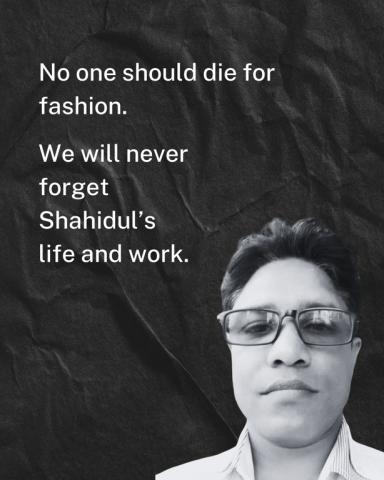
Photo: Clean Clothes Campaign
One year ago, trade union activist Shahidul Islam was attacked and killed in front of the Prince Jacquard Sweaters Ltd factory in Bangladesh. Despite repeated outreach by the Clean Clothes Campaign (CCC) network to over 50 garment brands identified as sourcing from the factory, the family has received very little compensation from only one of those brands.
MSN joins our Bangladeshi and international labour partners in commemorating Shahidul Islam’s life and union activism. We urge all brands that sourced from the factory to ensure that his family receives adequate compensation, and we call on all brands sourcing from Bangladesh to take meaningful measures to ensure respect for workers’ right to freedom of association.
Shahidul Islam was an organizer for the Bangladesh Garment and Industrial Workers Federation (BGIWF) for 25 years. He became involved in the Prince Jacquard Sweaters Ltd workers’ fight for their wages and bonuses that had gone unpaid since December 2022. On June 25, 2023, he left a meeting with the factory management when a gang of men attacked and killed him because of his activism. He left behind a wife and two sons.
According to BGIWF president Kalpona Akter, "It has been one whole year since Shahidul's murder and still brands refuse to accept any responsibility. If brands claim to promote human rights due diligence in their supply chains, when will they take action to ensure that organizers like Shahidul Islam can exercise their right to freedom of association without fear of violence? When will they compensate his grieving family?"
Since Shahidul’s murder, the CCC network, of which MSN is a member, has been calling on the government of Bangladesh to carry out a thorough and transparent investigation of the murder in order to identify all perpetrators, as well as the connections between the assailants and the factory management.
One year later, the investigation drags on. To date, one administrative staff person of Prince Jacquard Sweaters Ltd. and 13 other individuals involved in the attack have been charged, but labour rights groups and Shahidul’s family maintain that higher level company officials were likely involved and should also be investigated.
CCC network members have identified and contacted over 50 brands that sourced from the factory between one year before the murder and the months after, urging them to contribute to compensation for the family. In line with ILO Convention 121, the compensation should, at minimum, amount to at least 24,934,830 BDT (ca. 212k USD) to replace Shahidul Islam’s expected lifetime earnings, but compensation could be higher to account for his family’s emotional pain and suffering. To date, only one brand has contributed to compensation for the family, amounting to a mere 2% of what the family should receive.
On the anniversary of the murder, the CCC launched a tracker to monitor whether and how much specific brands have contributed in compensation to the family. Six brands carry extra responsibility to pay up, including US-Canadian RD Styles (which supplies to Saks Off Fifth, Anthropologie and others), which was among the factory’s largest buyers in the year before the murder and in the year since.
According to Emma Vogt, CCC’s Urgent Appeals Coordinator, “Together, these six companies placed orders worth hundreds of thousands of dollars to this factory, keeping it afloat while it trampled on its workers’ rights. They looked away when the worst possible human rights violation happened in their supply chain. They could easily afford to contribute to ensure the family does not fall into poverty, and should do so immediately.”
The murder is indicative of the intensely repressive environment in which garment workers in Bangladesh produce clothes for apparel brands and consumers around the world. Only five months after the murder, a major crackdown on wage protests led to four workers being killed, dozens arrested, and thousands more threatened with legal charges.
Garment brands fuel this repression through their insistence on low prices and the implicit threat that they could shift production to even lower wage countries if their price demands are not satisfied. Factory owners and the government of Bangladesh have violently repressed garment workers’ attempts to organize and their demands for higher wages in order to remain internationally competitive.
Brands have largely failed to take responsibility, preferring to hide behind social audits. Human Rights Watch has shown, however, that these social audits are “inadequate to monitor and respond to threats to workers trying to organize independent unions.”
All brands sourcing from Bangladesh must ensure that all their suppliers respect fundamental labour rights, including the right to freedom of association and to bargain collectively, and brands should promptly investigate and take action to address any violations of these rights in their supply chains.
According to Babul Akter, General Secretary of BGIWF, "Shahidul Islam was killed outside Prince Jacquard Sweaters Ltd., but workers and organizers fear violence and harassment in many other factories as well. All brands and buyers should pay attention, be accountable, and take steps to make their supply chain safe."
For more information:
- Track which brands have contributed to the compensation fund (CCC)
- Justice Delayed: One Year Since the Murder of Shahidul Islam (Solidarity Center)
- Statement issued immediately after the murder in 2023 (CCC)
- MSN condemns murder of Bangladeshi union leader Shahidul Islam Shahid (MSN)
- Bangladesh: Workers mobilize for 23,000 Taka minimum wage (MSN)
- Bangladesh: Social Audits Shortchange Workers (Human Rights Watch)